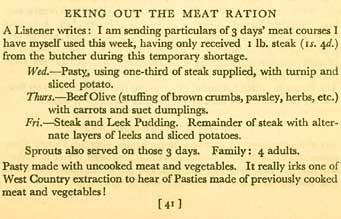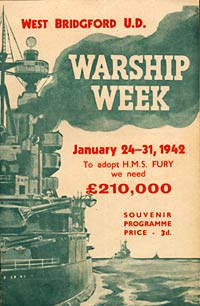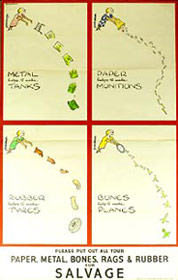Keep the home fires burning
In times of war, women have always had to shoulder the responsibility for running the household, even managing sizeable family estates. This could be a considerable challenge for women traditionally used to relying on the man as the head of the household to shield them from financial and practical worries. Women have had to demonstrate courage, determination and ingenuity to keep their families fed and clothed during wartime shortages.
Food rationing was first introduced on a national scale during the First World War in the United Kingdom, but not until 1917. Learning from this experience and to ensure greater equality for all, rationing of food and clothing was introduced in September 1939.

A Listener's suggestions from 'Two Hundred War-Time Recipes'

Cover of 'Two Hundred War-Time Recipes', 1941 (Private collection)
During the Second World War, when the effects of war hit civilians as directly as military personnel, women played a crucial role in protecting their own and other families from military actions. They did duty as firewatchers, gathered children into the air raid shelters and took in evacuees and blitz victims as part of their normal daily life.
In addition, the desire of ordinary women to make a personal contribution to the war effort can be seen in the popularity of schemes ranging from fund raising for warships to sending parcels for soldiers and prisoners of war.

Cover of warship week leaflet (Acc 1077-1-29)

Poster requesting salvage materials (WWP 4/1/29)
Yesterday was Christmas for thousands of London children
Five thousand cheap-travel vouchers were issued in London yesterday to fathers and mothers who left eagerly - loaded with brown-paper parcels and lunch-baskets - in ''See-the-Children'' specials for a few hours' reunion with their evacuated families. And were the children eager, too? This waiting group at Ipswich answers that one.
We kept rabbits in our backyard, mostly for showing, but also as pets, and I recall when things must have been really difficult and food became hard to buy Mam cooked a meal we all enjoyed and then told us that we had eaten Binkie, one of our pet rabbits.
Berna Moody
I remember too well being cold, as we could not get fuel for the central heating. Algeria is a cold and wet country in the winter. And I was always hungry.
Germaine Jones, French-Algerian of Jewish descent
I remember evacuees. About fifty came to our school. Some lived on the farms nearby and one, Sylvia, became my best friend, … I was sad when she moved on. They came from all walks of life - some were not very nice and the school playground became a personality contest and test of strength. Most of them didn't stay long… I wish we had cared more.
Margaret Anderson
We only had the clothes we 'stood up in' and I was extremely embarrassed to be travelling on a bus with my pyjama trousers showing under my navy school gabardine mackintosh. As we walked along the road there was almost complete devastation of the twenty-eight houses, all had windows blown out and were structurally damaged and many were just a pile of rubble. Our own house had only the rear wall left standing.
Hilary Mullineux in Wallasey, Cheshire; March 1941
One day the sirens were going a lot, it was nine o'clock when some children were going to school. What a massacre, little hands, little baskets, shoes, all the little bodies … I saw they [the allies] had bombed all the way the children were going to school.
Tina Sandri, living in Vicenza, Italy during the Second World War
I remember one weekend my friends and myself had a little sale in my mother's front room…we made quite few pounds which we used to buy wool to knit gloves and balaclava helmets and to purchase razor blades, combs and sweets and anything that would let our troops know they were in our thoughts. We were really proud of that, and felt we had really done something to help our troops.
Barbara Danter née Miller, serving in the ATS during World War II
Next: It's a man's world